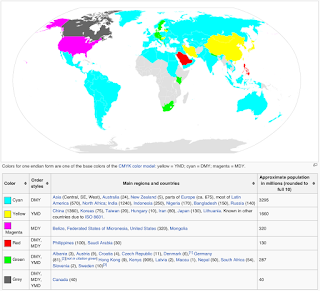 |
| Worldwide Date Standards |
Now, the second issue with us Americans... In Europe and other places in the world they write the day first, then the month, so 3/7/50 would be 3 July 1850 if it was written in, say, Germany (where he lived). Ahhhhhh, all those other wrong dates that said July now make total sense. It is indeed July 3rd. A date like 30/12/1901 is easier to figure out, as there isn't a way to have a 30th month, but that doesn't work for anything earlier than the 12th of every month.
So, genealogists around the world have settled on a genealogical standard. It's DAY MONTH YEAR, with the MONTH spelled out. Something like 3 July 1850 or 30 December 1901 and the like. There is zero confusion about that, right?
Well, not exactly. Some people think that you should abbreviate to three letters and uppercase them, such as 3 JUL 1850 and 30 DEC 1901. That's fine if you speak English, but what does DEC mean to someone from Germany? December is Dezember in German, so that's close if you spell it out. But in Fiji it's Tiiseba, and in Czech it's prosinec. English abbreviations are just dangerous, sorry. However, there is a compromise between having to type too much and getting the data correct. So, for those so inclined to shortcut a little bit, the common data entry standard is to abbreviate to the English month names to Jan, Feb, Mar, Apr, May, Jun, Jul, Aug, Sep, Oct, Nov, Dec -- without a period after them. FamilySearch does not abbreviate the month names, but will take your shortcuts and automatically spell them out for you -- which is nice.
The goal is to denote dates that are clear, readable, and trustworthy. Dates are important in genealogy. You know, like birth date, marriage, and date of death?
Now, just to throw in a couple of other standards for estimated dates. If you think you are close, you can type in abt 1850, where abt means "about". If the last you've seen someone was the 1900 census, you can document the date as "aft 1900", meaning after 1900. Likewise with "bef" for before, "bet" for between, and "cal" for calculated. Again, abbreviations are less clear and readable than spelling things out.
Stick to the standards. They are there to reduce confusion. There is thought behind them. And thus, I hope to pass on unambiguous data to future generations...
Emanuel Wolff
Born: 3 July 1850
Married: about 1879
Died: 30 December 1901

No comments :
Post a Comment